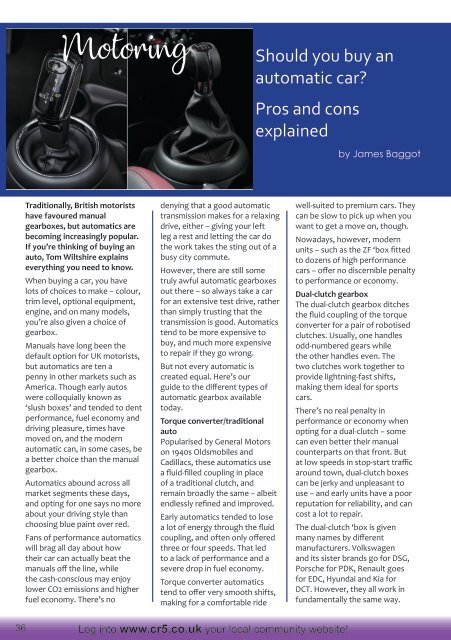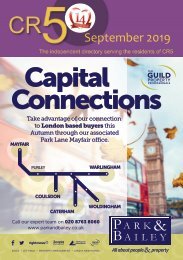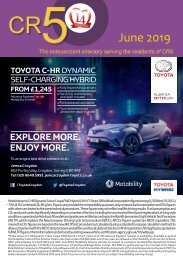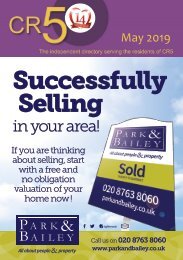CR5 Issue 158 July 2018
A free community magazine delivered to 11,600 residents in the CR5 postcode containing local business advertising, interesting reads, puzzles and "What's On" in the area
A free community magazine delivered to 11,600 residents in the CR5 postcode containing local business advertising, interesting reads, puzzles and "What's On" in the area
You also want an ePaper? Increase the reach of your titles
YUMPU automatically turns print PDFs into web optimized ePapers that Google loves.
Motoring<br />
Should you buy an<br />
automatic car?<br />
Pros and cons<br />
explained<br />
by James Baggot<br />
Traditionally, British motorists<br />
have favoured manual<br />
gearboxes, but automatics are<br />
becoming increasingly popular.<br />
If you’re thinking of buying an<br />
auto, Tom Wiltshire explains<br />
everything you need to know.<br />
When buying a car, you have<br />
lots of choices to make – colour,<br />
trim level, optional equipment,<br />
engine, and on many models,<br />
you’re also given a choice of<br />
gearbox.<br />
Manuals have long been the<br />
default option for UK motorists,<br />
but automatics are ten a<br />
penny in other markets such as<br />
America. Though early autos<br />
were colloquially known as<br />
‘slush boxes’ and tended to dent<br />
performance, fuel economy and<br />
driving pleasure, times have<br />
moved on, and the modern<br />
automatic can, in some cases, be<br />
a better choice than the manual<br />
gearbox.<br />
Automatics abound across all<br />
market segments these days,<br />
and opting for one says no more<br />
about your driving style than<br />
choosing blue paint over red.<br />
Fans of performance automatics<br />
will brag all day about how<br />
their car can actually beat the<br />
manuals off the line, while<br />
the cash-conscious may enjoy<br />
lower CO2 emissions and higher<br />
fuel economy. There’s no<br />
denying that a good automatic<br />
transmission makes for a relaxing<br />
drive, either – giving your left<br />
leg a rest and letting the car do<br />
the work takes the sting out of a<br />
busy city commute.<br />
However, there are still some<br />
truly awful automatic gearboxes<br />
out there – so always take a car<br />
for an extensive test drive, rather<br />
than simply trusting that the<br />
transmission is good. Automatics<br />
tend to be more expensive to<br />
buy, and much more expensive<br />
to repair if they go wrong.<br />
But not every automatic is<br />
created equal. Here’s our<br />
guide to the different types of<br />
automatic gearbox available<br />
today.<br />
Torque converter/traditional<br />
auto<br />
Popularised by General Motors<br />
on 1940s Oldsmobiles and<br />
Cadillacs, these automatics use<br />
a fluid-filled coupling in place<br />
of a traditional clutch, and<br />
remain broadly the same – albeit<br />
endlessly refined and improved.<br />
Early automatics tended to lose<br />
a lot of energy through the fluid<br />
coupling, and often only offered<br />
three or four speeds. That led<br />
to a lack of performance and a<br />
severe drop in fuel economy.<br />
Torque converter automatics<br />
tend to offer very smooth shifts,<br />
making for a comfortable ride<br />
well-suited to premium cars. They<br />
can be slow to pick up when you<br />
want to get a move on, though.<br />
Nowadays, however, modern<br />
units – such as the ZF ‘box fitted<br />
to dozens of high performance<br />
cars – offer no discernible penalty<br />
to performance or economy.<br />
Dual-clutch gearbox<br />
The dual-clutch gearbox ditches<br />
the fluid coupling of the torque<br />
converter for a pair of robotised<br />
clutches. Usually, one handles<br />
odd-numbered gears while<br />
the other handles even. The<br />
two clutches work together to<br />
provide lightning-fast shifts,<br />
making them ideal for sports<br />
cars.<br />
There’s no real penalty in<br />
performance or economy when<br />
opting for a dual-clutch – some<br />
can even better their manual<br />
counterparts on that front. But<br />
at low speeds in stop-start traffic<br />
around town, dual-clutch boxes<br />
can be jerky and unpleasant to<br />
use – and early units have a poor<br />
reputation for reliability, and can<br />
cost a lot to repair.<br />
The dual-clutch ‘box is given<br />
many names by different<br />
manufacturers. Volkswagen<br />
and its sister brands go for DSG,<br />
Porsche for PDK, Renault goes<br />
for EDC, Hyundai and Kia for<br />
DCT. However, they all work in<br />
fundamentally the same way.<br />
36 Log into www.cr5.co.uk your local community website!

















